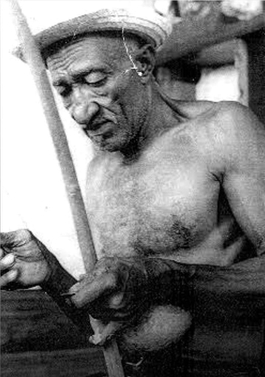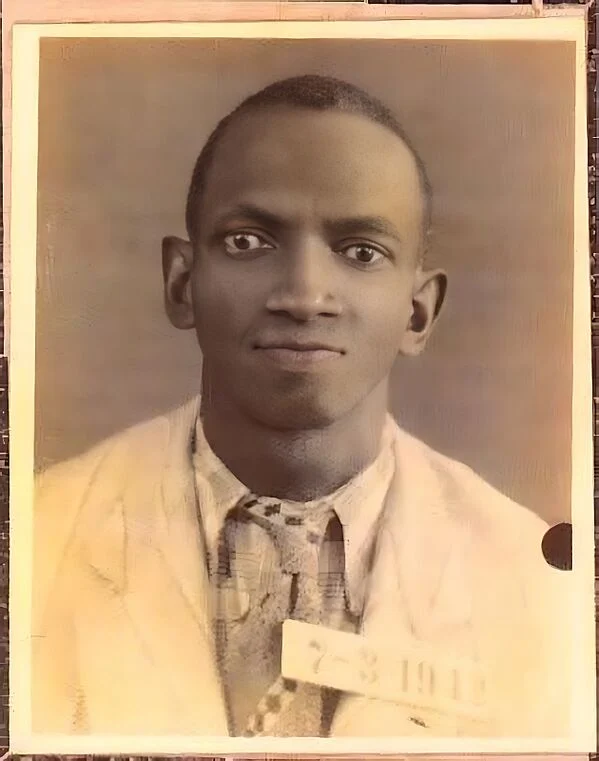- Lived in: Salvador, Bahia, Brazil
- Date of Birth: 03-Aug-1909
- Date of Death: 17-Nov-1877
- Learned from: Mestre Cândido Pequeno
- Capoeira Style: Angola
Biography:
Mestre Noronha, born Daniel Coutinho on August 3, 1909, in Salvador, Bahia, is remembered as one of the most influential Capoeira Angola masters of the early 20th century. His journey through Capoeira and life made him a pivotal figure in preserving and promoting Capoeira Angola at a time when the art was still considered illegal and marginalized by society.
Early Life and Introduction to Capoeira
Mestre Noronha grew up in the Sapateiros neighborhood in Salvador, where his early life was marked by hardship. At the age of 8, in 1917, he began his training in Capoeira under the guidance of Mestre Cândido Pequeno, known as one of the top Capoeira practitioners in Bahia. From the beginning, Noronha was immersed in the tradition of Capoeira, a practice that was outlawed at the time, which added an element of danger and secrecy to his training.
At a young age, Noronha found himself involved in a hostile confrontation during a Capoeira demonstration at Curva Grande, where his group faced off against a rival force, reportedly backed by the police. This incident highlighted the tensions that Capoeira practitioners often faced from law enforcement, as the art was closely associated with the marginalized and working classes.
Founding the First Capoeira Angola Center
In the 1920s, Mestre Noronha played a central role in founding the Centro de Capoeira Angola in the Liberdade neighborhood of Salvador, a hub for Capoeira Angola practitioners. Along with key figures like his brother Livino and other mestres such as Mestre Amorzinho and Mestre Aberrê, Noronha established one of the first organized centers dedicated to Capoeira Angola in Bahia.
The center became a place for teaching and preserving the art, and the colors of the center, green and yellow, represented the Brazilian flag, symbolizing a deep sense of cultural pride. The Capoeira Angola practiced here followed a set of clear rules, emphasizing respect, honor, and skill during demonstrations. As part of this cultural movement, the center served as a gathering point for Capoeira exhibitions and demonstrations, providing a space for the art to flourish despite the social and legal challenges of the time.
Influence and Legacy
Mestre Noronha was a mentor to many, and his influence extended far beyond his role as a teacher. He was known for his deep understanding of Capoeira's roots and philosophy. One of his most significant students was Mestre Pastinha, a key figure in the development of Capoeira Angola in the 20th century. Through his teaching, Mestre Noronha preserved the essence of Capoeira Angola while promoting its values of discipline, humility, and respect.
In 1941, Noronha, along with other mestres, handed over the leadership of the Centro Nacional de Capoeira de Origem Angola to Mestre Pastinha, recognizing his ability to elevate Capoeira Angola and ensure its growth in the coming decades.
Later Years and Contributions to Capoeira Literature
Throughout his life, Mestre Noronha worked in a variety of jobs to support himself, including as a shoeshine boy, stevedore, and truck driver assistant. Despite the financial struggles he faced, his dedication to Capoeira remained steadfast. In his later years, Noronha became involved in cultural preservation, participating in Jair Moura's film Dança de Guerra in 1968.
Mestre Noronha’s most significant literary contribution was his book, "O ABC da Capoeira Angola - Os Manuscritos do Mestre Noronha", which was published posthumously in 1993. This collection of writings has become a foundational text for Capoeira practitioners, offering insights into the philosophy, techniques, and cultural significance of Capoeira Angola.
Death and Lasting Impact
Mestre Noronha passed away on November 17, 1977, leaving behind a legacy that continues to shape the world of Capoeira today. His writings, teachings, and the centers he helped establish laid the groundwork for the continued growth and development of Capoeira Angola in Bahia and beyond. His influence is still felt among modern Capoeira practitioners, especially those who follow the traditional practices of Capoeira Angola.
Mestre Noronha’s legacy is honored through his writings, his students, and the ongoing practice of Capoeira Angola, which he dedicated his life to preserving. Through his efforts, Capoeira remains a vibrant and integral part of Brazilian cultural heritage.

